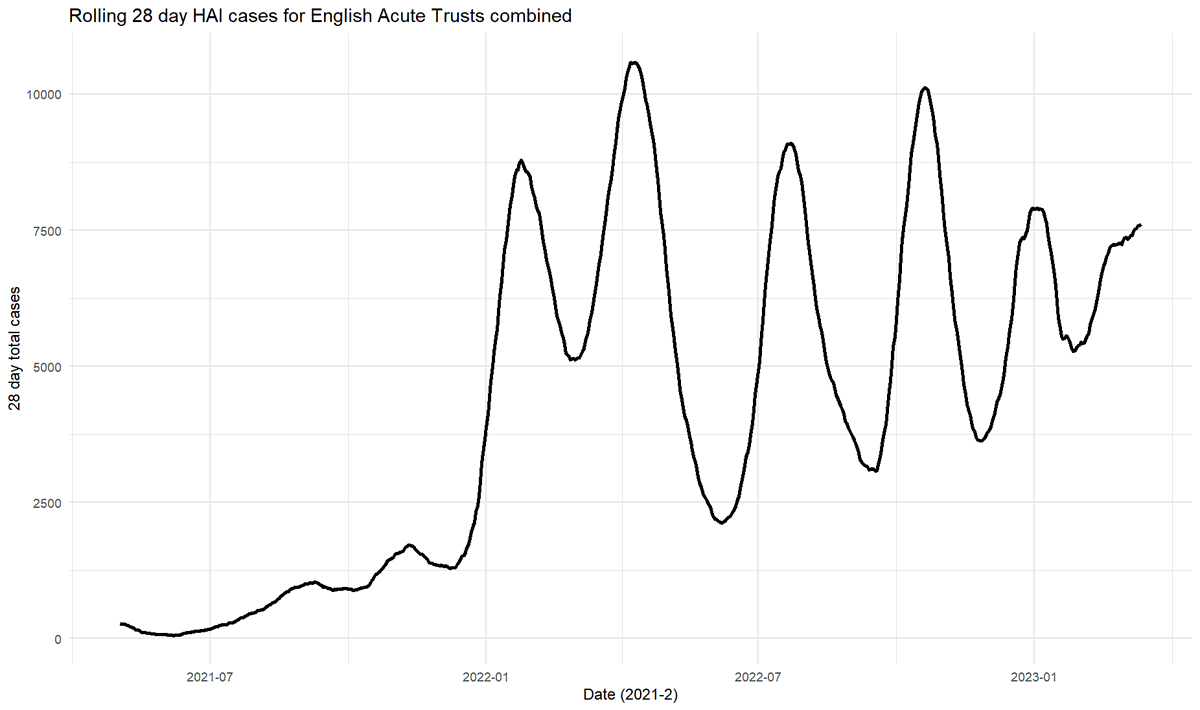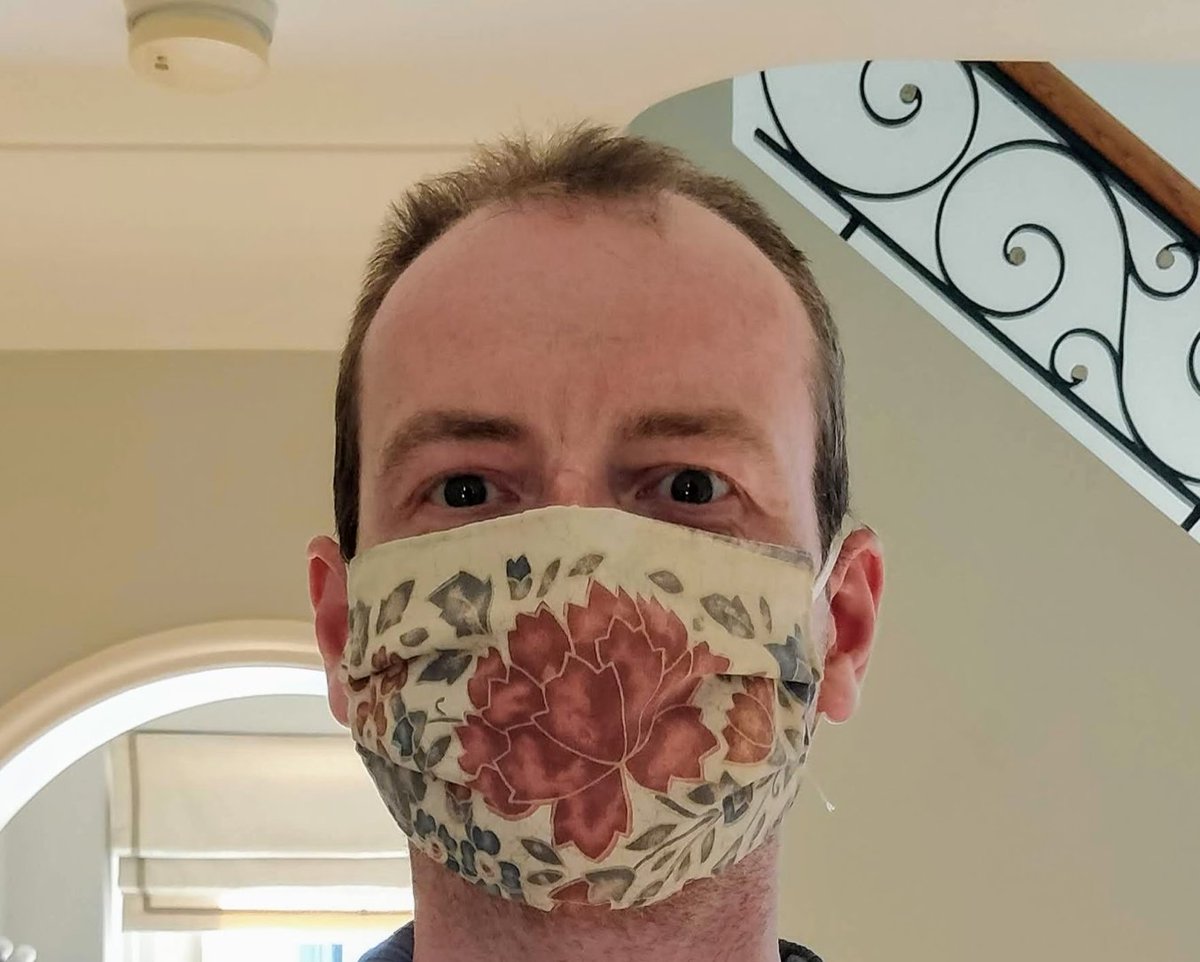
Large GBR long distance triathlete.
Critical Care @BTHFT, head Clinical AI, fellow @AAIP_York & Hon. Prof. MBE.
Ran in a mask once. (he)
@LawtonTri.bsky.social
How to get URL link on X (Twitter) App


 Unfortunately, the monthly data has also been reduced and now only reports whether people were diagnosed on or after coming to hospital. Those diagnosed after admission will include people catching it in hospital, but also some who caught it earlier.
Unfortunately, the monthly data has also been reduced and now only reports whether people were diagnosed on or after coming to hospital. Those diagnosed after admission will include people catching it in hospital, but also some who caught it earlier.
 Over 83,000 people with hospital-acquired Covid-19 in a year (and likely an underestimate!). Many of these will have died.
Over 83,000 people with hospital-acquired Covid-19 in a year (and likely an underestimate!). Many of these will have died.

 Absolute values still show a downward trend (and yes I think this is real), but the rising percentage suggests that this is just because of low prevalence rather than that we've fundamentally improved things.
Absolute values still show a downward trend (and yes I think this is real), but the rising percentage suggests that this is just because of low prevalence rather than that we've fundamentally improved things.

 At least we may be ending on a low for absolute values; though at just below 30% the percentage remains concerningly high (and rising).
At least we may be ending on a low for absolute values; though at just below 30% the percentage remains concerningly high (and rising).

 Absolute numbers suggest that this latest wave might be coming to an end. But the rising baseline still looks very concerning - what are we doing to try to reduce this?
Absolute numbers suggest that this latest wave might be coming to an end. But the rising baseline still looks very concerning - what are we doing to try to reduce this?

 On the chart of absolute numbers, it becomes clear that last week's "long peak" wasn't even that - it's going back up.
On the chart of absolute numbers, it becomes clear that last week's "long peak" wasn't even that - it's going back up.

 The fifth hospital-acquired wave is well under way. If it's like the others (including the 2020/21 wave) it will peak at around 10,000 patients per month being infected in English hospitals.
The fifth hospital-acquired wave is well under way. If it's like the others (including the 2020/21 wave) it will peak at around 10,000 patients per month being infected in English hospitals.

 Estimated 7-day risk (for those who came in without it) by trust varies massively. Unfortunately, hospitals are full and cohorting is difficult. Could attention to air quality help even if we might struggle with the rest given current resourcing?
Estimated 7-day risk (for those who came in without it) by trust varies massively. Unfortunately, hospitals are full and cohorting is difficult. Could attention to air quality help even if we might struggle with the rest given current resourcing?

 Some of this will be testing behaviours, but we're seeing more and more evidence that the proportion of people coming to hospital with something else and catching Covid there is higher than it should be, and growing. And Covid is unlikely to help make them better.
Some of this will be testing behaviours, but we're seeing more and more evidence that the proportion of people coming to hospital with something else and catching Covid there is higher than it should be, and growing. And Covid is unlikely to help make them better.

 This study was designed at a time when UK guidance allowed surgical masks for an airborne disease (so long as it wasn't "wholly" airborne). In fact, I'm told some of the study team were involved in creation of this guidance!
This study was designed at a time when UK guidance allowed surgical masks for an airborne disease (so long as it wasn't "wholly" airborne). In fact, I'm told some of the study team were involved in creation of this guidance!
 Given the choice, they will consume up to 20g/kg ethanol a day - equivalent to a "standard man" drinking 21 bottles of wine each day.
Given the choice, they will consume up to 20g/kg ethanol a day - equivalent to a "standard man" drinking 21 bottles of wine each day.
 @CathNoakes @mjb302 @LadyScorcher @hughes_eilir And the fact is that, whilst my immediate colleagues and I were safe in our (airborne) PPE, and the death rate was much lower than those early estimates, hundreds of NHS staff have died - and a lot of those infections will have been caught in the workplace. 2/
@CathNoakes @mjb302 @LadyScorcher @hughes_eilir And the fact is that, whilst my immediate colleagues and I were safe in our (airborne) PPE, and the death rate was much lower than those early estimates, hundreds of NHS staff have died - and a lot of those infections will have been caught in the workplace. 2/


 Why? Not clear but I think most would agree a focus on regular testing and cohorting patients, and good basic infection control practices have helped.
Why? Not clear but I think most would agree a focus on regular testing and cohorting patients, and good basic infection control practices have helped.

 Interestingly, CPAP reduced the duration of invasive ventilation even in those who were intubated - so possible that delaying intubation is no bad thing.
Interestingly, CPAP reduced the duration of invasive ventilation even in those who were intubated - so possible that delaying intubation is no bad thing.
 A simple swap of surgical masks (droplet) for FFP3 (airborne) appears to have eliminated the excess risk of infection from working on a red ward - from what was a 47-fold increase. 2/
A simple swap of surgical masks (droplet) for FFP3 (airborne) appears to have eliminated the excess risk of infection from working on a red ward - from what was a 47-fold increase. 2/

 Updated chart (data to 31st Jan 21)
Updated chart (data to 31st Jan 21)
